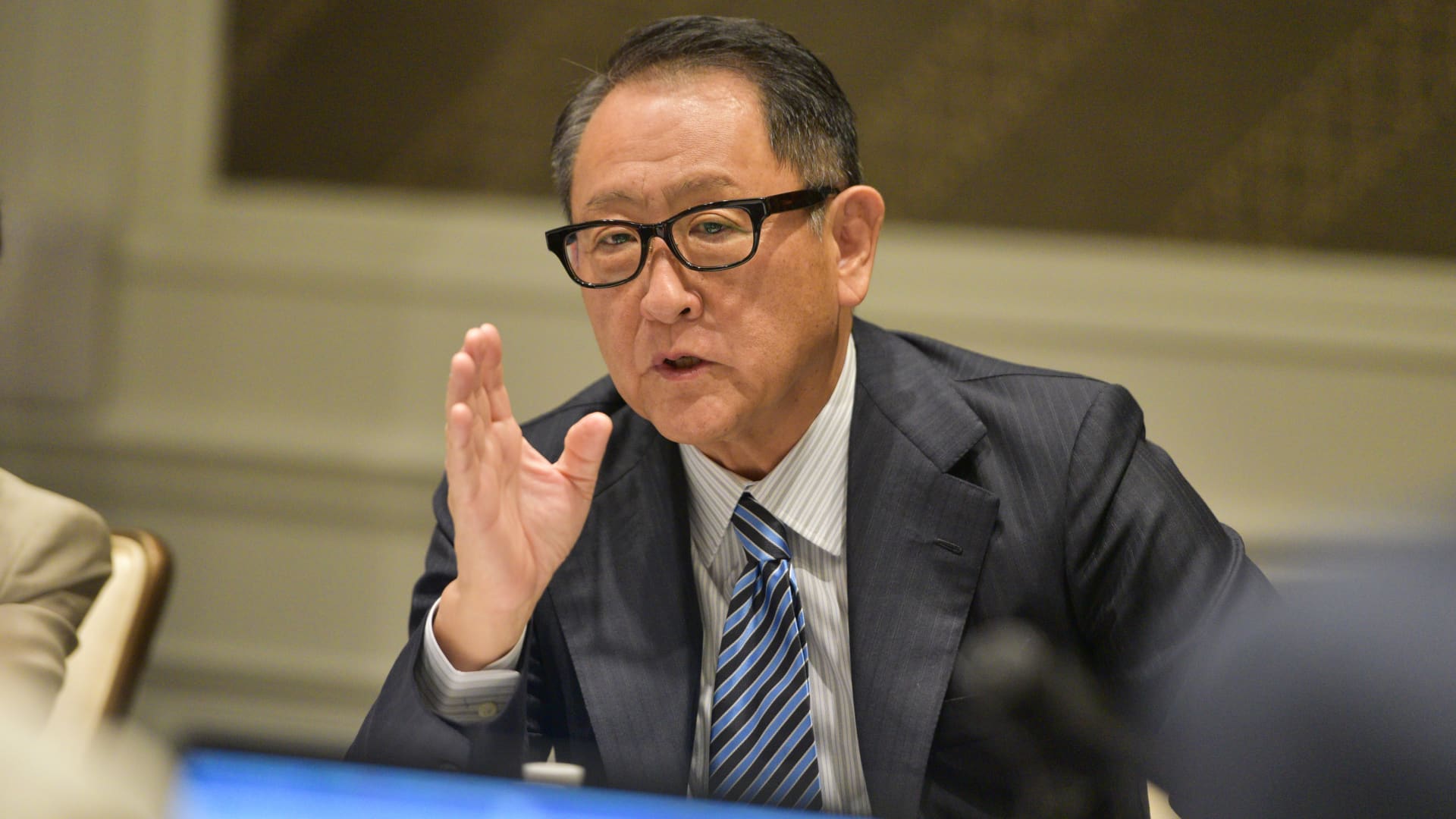LAS VEGAS — Toyota Motor CEO Akio Toyoda last week simply stated what he would like his legacy to be: “I love cars.”
Just how the 66-year-old racer, car enthusiast and company scion will be remembered regarding his approach to all-electric vehicles compared to gas-powered performance cars, like the Supra, or hybrids, like the once-groundbreaking Prius, will play out in the years to come.
Toyota, the world’s largest automaker, plans to invest $70 billion in electrified vehicles over the next nine years. Half of that will be for all-electric battery ones. While it’s a substantial investment in EVs, it’s smaller than some competitors’ plans, and not as much as some would like given Toyota’s global footprint.
Despite criticism from some investors and environmental groups, Toyoda this past week doubled down on his strategy to continue investing in a range of electrified vehicles as opposed to competitors such as Volkswagen and General Motors, which have said they are going all-in on all-electric vehicles.
The plans could arguably cement Toyoda’s “I love cars” legacy or tarnish it, depending on how quickly drivers adopt electric vehicles.
“For me, playing to win also means doing things differently. Doing things that others may question, but that we believe will put us in the winner’s circle the longest,” he said Wednesday during Toyota’s annual dealer meeting in Las Vegas, which, by the way, was called “Playing to Win.”
Toyoda, who described Toyota as a large department store, said the company’s goal “remains the same, pleasing the widest possible range of customers with the widest possible range of powertrains.” Those powertrains will include hybrids and plug-in hybrids like the Prius, hydrogen fuel cell vehicles like the Mirai and 15 all-electric battery models by 2025.
Aside from the EV plans, Toyoda discussed several other aspects of the company’s business last week during the dealer meeting and a small roundtable with U.S. media.
EV regulations and materials
Toyoda reiterated that he does not believe all-electric vehicles will be adopted as quickly as policy regulators and competitors think, due to a variety of reasons. He cited lack of infrastructure, pricing and how customers’ choices vary region to region as examples of possible roadblocks.
He believes it will be “difficult” to fulfill recent regulations that call for banning traditional vehicles with internal combustion engines by 2035, like California and New York have said they will adopt.
“Just like the fully autonomous cars that we are all supposed to be driving by now, EVs are just going to take longer to become mainstream than media would like us to believe,” Toyoda said in a recording of the remarks to dealers shown to reporters. “In the meantime, you have many options for customers.”
Toyoda also believes there will be “tremendous shortages” of lithium and battery grade nickel in the next five to 10 years, leading to production and supply chain problems.
Carbon neutrality
Toyota’s goal is carbon neutrality by 2050, and not just through all-electric vehicles. Some have questioned the environmental impact of EVs when factoring in raw material mining and overall vehicle production.
Since the Prius launched in 1997, Toyota says it has sold more than 20 million electrified vehicles worldwide. The company says those sales have avoided 160 million tons of CO2 emissions, which is the equivalent to the impact of 5.5 million all-electric battery vehicles.
“Toyota can produce eight 40-mile plug-in hybrids for every one 320-mile battery electric vehicle and save up to eight times the carbon emitted into the atmosphere,” according to prepared remarks for Toyoda provided to media.
Toyota’s hesitancy to launch all-electric vehicles has been criticized by environmental groups such as the Sierra Club and Greenpeace, which ranked the Japanese automaker at the bottom of its auto-industry decarbonization rankings the past two years.
Standing pat with dealers
Toyota has no plans to overhaul its franchised dealership network as it invests in electrified vehicles, like some competitors have announced.
“I know you are anxious about the future. I know you are worried about how this business will change. While I can’t predict the future, I can promise you this: You, me, us, this business, this franchised model is not going anywhere. It’s staying just as it is,” he told dealers to resounding applause.
The franchised dealer model has been under pressure after Tesla and newer EV startups began selling directly to consumers than rather through traditional dealers.
GM has offered buyouts to Buick and Cadillac dealers that don’t want to invest in EVs, while Ford last month announced dealers that want to sell EVs must become certified under one of two programs — with investments of $500,000 or $1.2 million.
‘Happy dance’
As part of lighthearted and comedic comments to dealers, Toyoda said he danced when the automaker outsold GM last year for the first time ever in the U.S.
Despite Toyota executives saying the accomplishment wasn’t sustainable — GM led through the first half of this year — Toyoda still felt it was cause for celebration.
“At Toyota, we like to keep our head down and not talk about our success,” Toyoda said before reenacting the dance on stage. “But when I heard you became No. 1 in the U.S. last year, I actually did a little happy dance in my office.”
